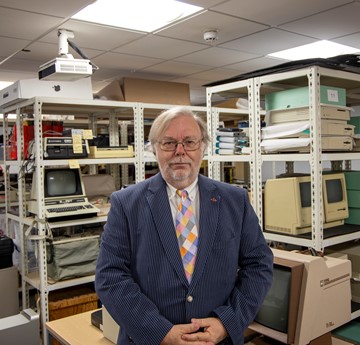Professor John Tucker is the warden of the University’s History of Computing Collection or HOCC, a fascinating archive of technological and social changes giving insight into Swansea’s extraordinary influence on the evolution of computing.
Professor Tucker has an encyclopaedic knowledge of the history of computing, including the history of computing in Wales, and the role of computers during wartime. He says, “I started putting the collection together from bits and pieces that existed in our Computer Science Department, but the collection is more than the equipment, it’s also a repository of knowledge and experience.”
The collection includes papers and books of computational scientist Leslie J Comrie, a doyen of numerical computation before the war and the reason why Swansea has expertise on computing before computers.
‘Modern’ computing took off at Swansea in the 1960s. “The University got its first electronic computer in 1962”, says Professor Tucker. “The computer was £22,120 and, as you can imagine, was a major purchase.”
It was on this machine that world-renowned civil engineer Professor Olek Zienkiewicz and his assistant Yau Kai Cheung did very important work on the finite element method. Bits of this iconic piece of computing still exist and are on display for all to see in the University’s new £32.5 million Computational Foundry based at the University’s Bay Campus.
The HOCC contains archives relating to the research of computer scientists who have worked at Swansea University. Many of these scientists were pioneers of modern computing.
The HOCC is also a wonderfully rich resource for research, teaching and civic mission. One example is the project Professor Tucker led looking at the history of the DVLA between 1965 and 1975, culminating in the Big Data Comes to Wales conference which took place in Swansea’s National Waterfront Museum in 2015. There is also research on the role of computers in steelmaking – Wales’s first computer was bought for Port Talbot steelworks. Professor Tucker is currently developing materials on the history of science and technology, especially in Wales, guided by the role played by computation. He is also a founder editor of a new historical book series by Springer and the University of Wales Press.
Read the full article in the centenary edition of the University’s research magazine, Momentum.

